The Hoxton Hotel: Talent Management Strategies in the Face of COVID-19
VerifiedAdded on 2023/01/05
|12
|2413
|29
Report
AI Summary
This report investigates the crucial role of talent management in addressing the challenges posed by the COVID-19 pandemic within the hospitality sector, using The Hoxton hotel as a specific case study. The study begins by outlining the background, research aim, objectives, and questions, emphasizing the rationale for analyzing the impact of COVID-19 on business operations. It explores the importance of talent management, encompassing employee recruitment, development, and motivation. The literature review delves into the significance of talent management in the hospitality industry, highlighting elements like employee training and performance incentives, and examines The Hoxton's talent management practices. The methodology section details the research philosophy, approach, and strategy, including the use of a survey and quantitative methods for data collection and analysis. Ethical considerations are addressed, ensuring data integrity and participant privacy. The report concludes by summarizing the role of talent management in mitigating the pandemic's effects, providing insights into strategies that can enhance employee skills and competencies to overcome industry challenges. The report also includes a Gantt chart outlining the research timeline and provides a comprehensive list of references to support its findings.

Paraphrase This Document
Need a fresh take? Get an instant paraphrase of this document with our AI Paraphraser
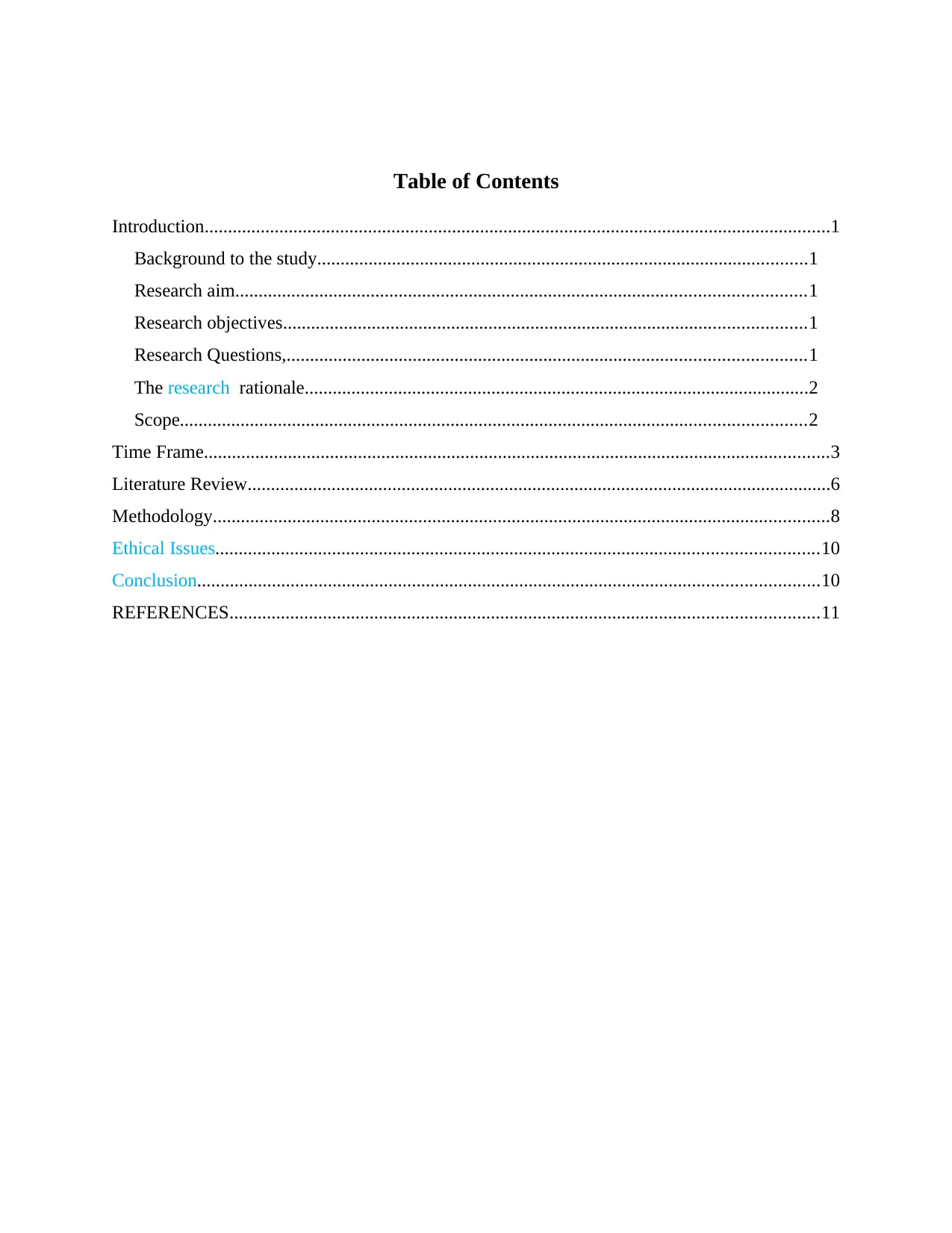
Table of Contents
Introduction......................................................................................................................................1
Background to the study.........................................................................................................1
Research aim..........................................................................................................................1
Research objectives................................................................................................................1
Research Questions,...............................................................................................................1
The research rationale............................................................................................................2
Scope......................................................................................................................................2
Time Frame......................................................................................................................................3
Literature Review.............................................................................................................................6
Methodology....................................................................................................................................8
Ethical Issues.................................................................................................................................10
Conclusion.....................................................................................................................................10
REFERENCES..............................................................................................................................11
Introduction......................................................................................................................................1
Background to the study.........................................................................................................1
Research aim..........................................................................................................................1
Research objectives................................................................................................................1
Research Questions,...............................................................................................................1
The research rationale............................................................................................................2
Scope......................................................................................................................................2
Time Frame......................................................................................................................................3
Literature Review.............................................................................................................................6
Methodology....................................................................................................................................8
Ethical Issues.................................................................................................................................10
Conclusion.....................................................................................................................................10
REFERENCES..............................................................................................................................11
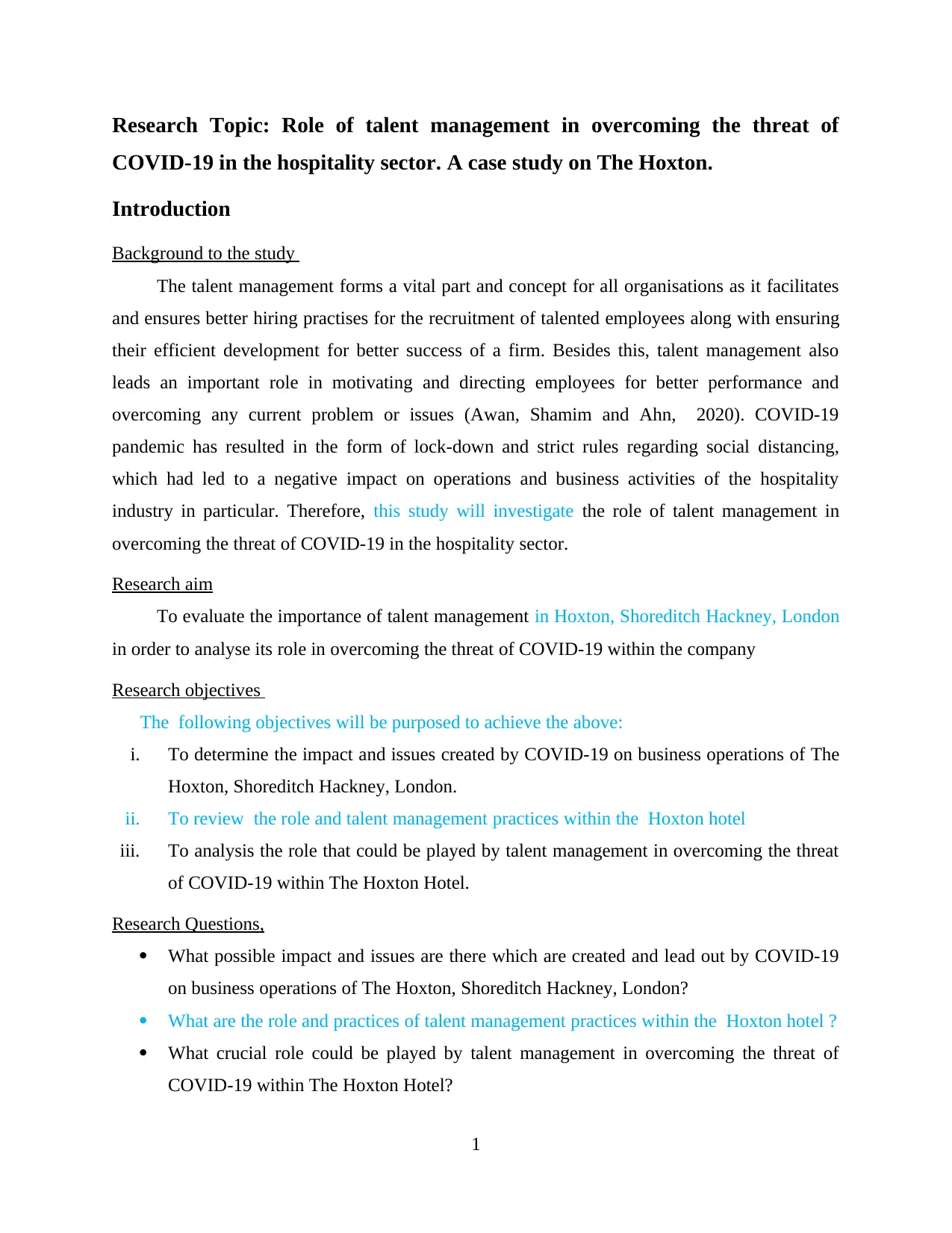
Research Topic: Role of talent management in overcoming the threat of
COVID-19 in the hospitality sector. A case study on The Hoxton.
Introduction
Background to the study
The talent management forms a vital part and concept for all organisations as it facilitates
and ensures better hiring practises for the recruitment of talented employees along with ensuring
their efficient development for better success of a firm. Besides this, talent management also
leads an important role in motivating and directing employees for better performance and
overcoming any current problem or issues (Awan, Shamim and Ahn, 2020). COVID-19
pandemic has resulted in the form of lock-down and strict rules regarding social distancing,
which had led to a negative impact on operations and business activities of the hospitality
industry in particular. Therefore, this study will investigate the role of talent management in
overcoming the threat of COVID-19 in the hospitality sector.
Research aim
To evaluate the importance of talent management in Hoxton, Shoreditch Hackney, London
in order to analyse its role in overcoming the threat of COVID-19 within the company
Research objectives
The following objectives will be purposed to achieve the above:
i. To determine the impact and issues created by COVID-19 on business operations of The
Hoxton, Shoreditch Hackney, London.
ii. To review the role and talent management practices within the Hoxton hotel
iii. To analysis the role that could be played by talent management in overcoming the threat
of COVID-19 within The Hoxton Hotel.
Research Questions,
What possible impact and issues are there which are created and lead out by COVID-19
on business operations of The Hoxton, Shoreditch Hackney, London?
What are the role and practices of talent management practices within the Hoxton hotel ?
What crucial role could be played by talent management in overcoming the threat of
COVID-19 within The Hoxton Hotel?
1
COVID-19 in the hospitality sector. A case study on The Hoxton.
Introduction
Background to the study
The talent management forms a vital part and concept for all organisations as it facilitates
and ensures better hiring practises for the recruitment of talented employees along with ensuring
their efficient development for better success of a firm. Besides this, talent management also
leads an important role in motivating and directing employees for better performance and
overcoming any current problem or issues (Awan, Shamim and Ahn, 2020). COVID-19
pandemic has resulted in the form of lock-down and strict rules regarding social distancing,
which had led to a negative impact on operations and business activities of the hospitality
industry in particular. Therefore, this study will investigate the role of talent management in
overcoming the threat of COVID-19 in the hospitality sector.
Research aim
To evaluate the importance of talent management in Hoxton, Shoreditch Hackney, London
in order to analyse its role in overcoming the threat of COVID-19 within the company
Research objectives
The following objectives will be purposed to achieve the above:
i. To determine the impact and issues created by COVID-19 on business operations of The
Hoxton, Shoreditch Hackney, London.
ii. To review the role and talent management practices within the Hoxton hotel
iii. To analysis the role that could be played by talent management in overcoming the threat
of COVID-19 within The Hoxton Hotel.
Research Questions,
What possible impact and issues are there which are created and lead out by COVID-19
on business operations of The Hoxton, Shoreditch Hackney, London?
What are the role and practices of talent management practices within the Hoxton hotel ?
What crucial role could be played by talent management in overcoming the threat of
COVID-19 within The Hoxton Hotel?
1
⊘ This is a preview!⊘
Do you want full access?
Subscribe today to unlock all pages.

Trusted by 1+ million students worldwide
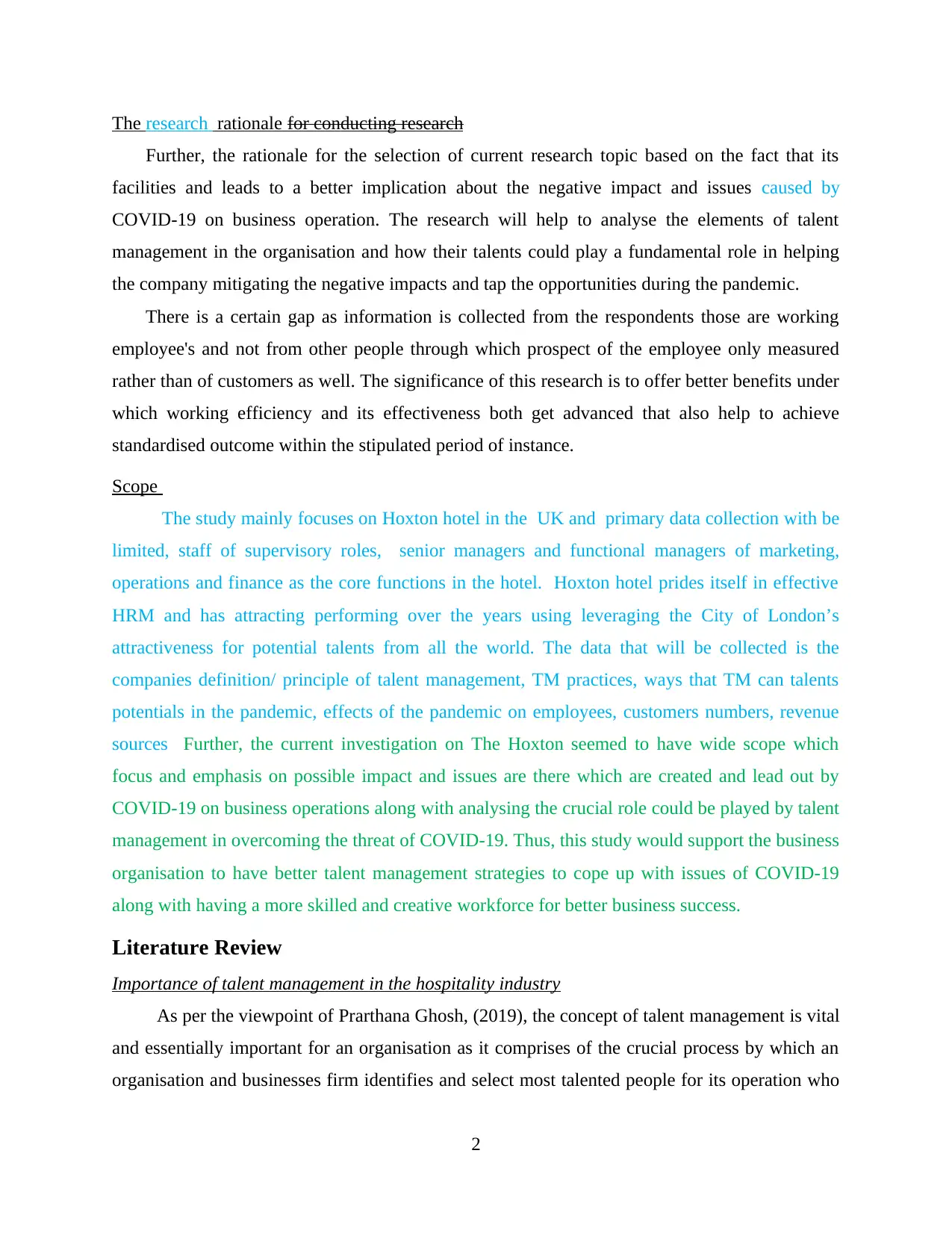
The research rationale for conducting research
Further, the rationale for the selection of current research topic based on the fact that its
facilities and leads to a better implication about the negative impact and issues caused by
COVID-19 on business operation. The research will help to analyse the elements of talent
management in the organisation and how their talents could play a fundamental role in helping
the company mitigating the negative impacts and tap the opportunities during the pandemic.
There is a certain gap as information is collected from the respondents those are working
employee's and not from other people through which prospect of the employee only measured
rather than of customers as well. The significance of this research is to offer better benefits under
which working efficiency and its effectiveness both get advanced that also help to achieve
standardised outcome within the stipulated period of instance.
Scope
The study mainly focuses on Hoxton hotel in the UK and primary data collection with be
limited, staff of supervisory roles, senior managers and functional managers of marketing,
operations and finance as the core functions in the hotel. Hoxton hotel prides itself in effective
HRM and has attracting performing over the years using leveraging the City of London’s
attractiveness for potential talents from all the world. The data that will be collected is the
companies definition/ principle of talent management, TM practices, ways that TM can talents
potentials in the pandemic, effects of the pandemic on employees, customers numbers, revenue
sources Further, the current investigation on The Hoxton seemed to have wide scope which
focus and emphasis on possible impact and issues are there which are created and lead out by
COVID-19 on business operations along with analysing the crucial role could be played by talent
management in overcoming the threat of COVID-19. Thus, this study would support the business
organisation to have better talent management strategies to cope up with issues of COVID-19
along with having a more skilled and creative workforce for better business success.
Literature Review
Importance of talent management in the hospitality industry
As per the viewpoint of Prarthana Ghosh, (2019), the concept of talent management is vital
and essentially important for an organisation as it comprises of the crucial process by which an
organisation and businesses firm identifies and select most talented people for its operation who
2
Further, the rationale for the selection of current research topic based on the fact that its
facilities and leads to a better implication about the negative impact and issues caused by
COVID-19 on business operation. The research will help to analyse the elements of talent
management in the organisation and how their talents could play a fundamental role in helping
the company mitigating the negative impacts and tap the opportunities during the pandemic.
There is a certain gap as information is collected from the respondents those are working
employee's and not from other people through which prospect of the employee only measured
rather than of customers as well. The significance of this research is to offer better benefits under
which working efficiency and its effectiveness both get advanced that also help to achieve
standardised outcome within the stipulated period of instance.
Scope
The study mainly focuses on Hoxton hotel in the UK and primary data collection with be
limited, staff of supervisory roles, senior managers and functional managers of marketing,
operations and finance as the core functions in the hotel. Hoxton hotel prides itself in effective
HRM and has attracting performing over the years using leveraging the City of London’s
attractiveness for potential talents from all the world. The data that will be collected is the
companies definition/ principle of talent management, TM practices, ways that TM can talents
potentials in the pandemic, effects of the pandemic on employees, customers numbers, revenue
sources Further, the current investigation on The Hoxton seemed to have wide scope which
focus and emphasis on possible impact and issues are there which are created and lead out by
COVID-19 on business operations along with analysing the crucial role could be played by talent
management in overcoming the threat of COVID-19. Thus, this study would support the business
organisation to have better talent management strategies to cope up with issues of COVID-19
along with having a more skilled and creative workforce for better business success.
Literature Review
Importance of talent management in the hospitality industry
As per the viewpoint of Prarthana Ghosh, (2019), the concept of talent management is vital
and essentially important for an organisation as it comprises of the crucial process by which an
organisation and businesses firm identifies and select most talented people for its operation who
2
Paraphrase This Document
Need a fresh take? Get an instant paraphrase of this document with our AI Paraphraser
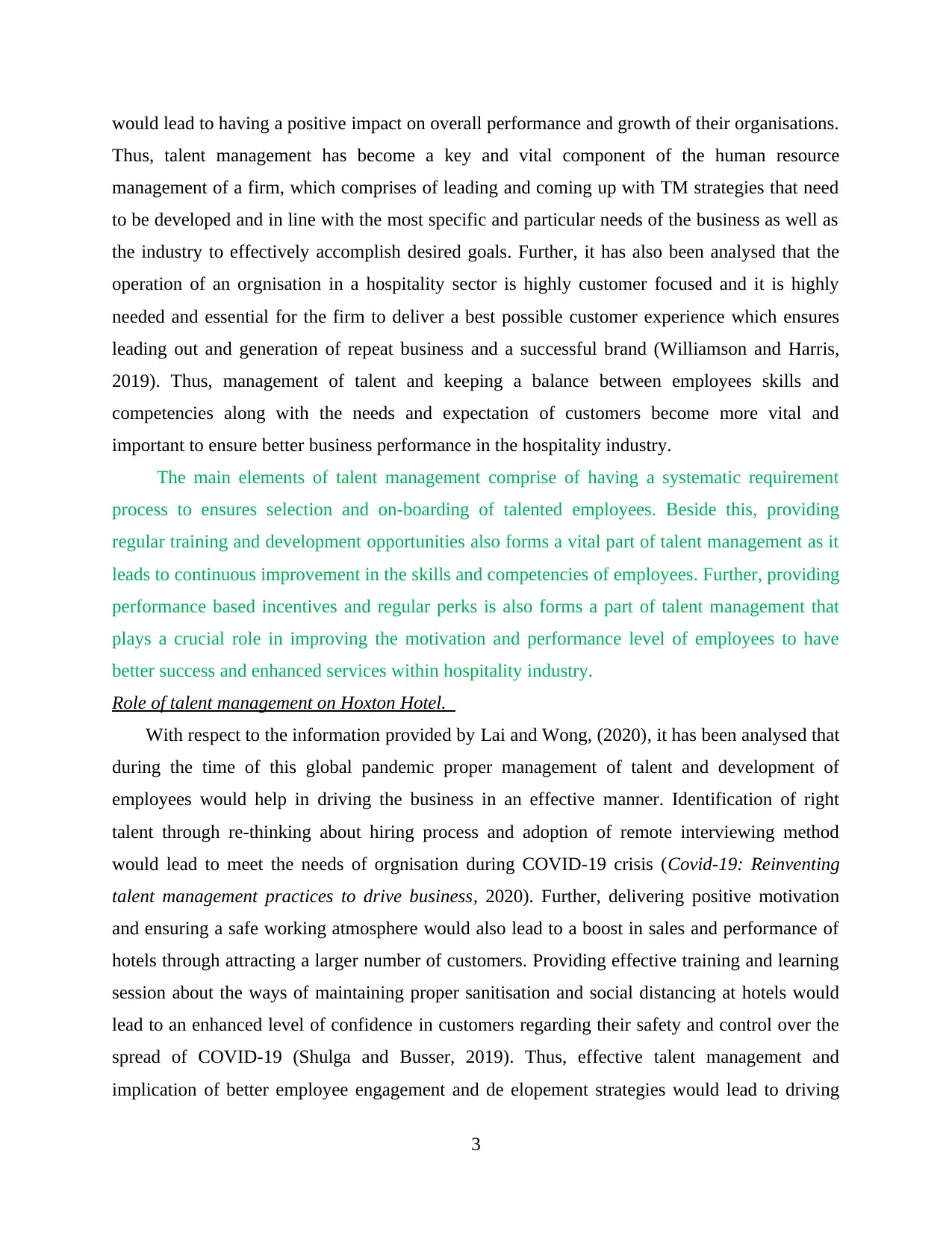
would lead to having a positive impact on overall performance and growth of their organisations.
Thus, talent management has become a key and vital component of the human resource
management of a firm, which comprises of leading and coming up with TM strategies that need
to be developed and in line with the most specific and particular needs of the business as well as
the industry to effectively accomplish desired goals. Further, it has also been analysed that the
operation of an orgnisation in a hospitality sector is highly customer focused and it is highly
needed and essential for the firm to deliver a best possible customer experience which ensures
leading out and generation of repeat business and a successful brand (Williamson and Harris,
2019). Thus, management of talent and keeping a balance between employees skills and
competencies along with the needs and expectation of customers become more vital and
important to ensure better business performance in the hospitality industry.
The main elements of talent management comprise of having a systematic requirement
process to ensures selection and on-boarding of talented employees. Beside this, providing
regular training and development opportunities also forms a vital part of talent management as it
leads to continuous improvement in the skills and competencies of employees. Further, providing
performance based incentives and regular perks is also forms a part of talent management that
plays a crucial role in improving the motivation and performance level of employees to have
better success and enhanced services within hospitality industry.
Role of talent management on Hoxton Hotel.
With respect to the information provided by Lai and Wong, (2020), it has been analysed that
during the time of this global pandemic proper management of talent and development of
employees would help in driving the business in an effective manner. Identification of right
talent through re-thinking about hiring process and adoption of remote interviewing method
would lead to meet the needs of orgnisation during COVID-19 crisis (Covid-19: Reinventing
talent management practices to drive business, 2020). Further, delivering positive motivation
and ensuring a safe working atmosphere would also lead to a boost in sales and performance of
hotels through attracting a larger number of customers. Providing effective training and learning
session about the ways of maintaining proper sanitisation and social distancing at hotels would
lead to an enhanced level of confidence in customers regarding their safety and control over the
spread of COVID-19 (Shulga and Busser, 2019). Thus, effective talent management and
implication of better employee engagement and de elopement strategies would lead to driving
3
Thus, talent management has become a key and vital component of the human resource
management of a firm, which comprises of leading and coming up with TM strategies that need
to be developed and in line with the most specific and particular needs of the business as well as
the industry to effectively accomplish desired goals. Further, it has also been analysed that the
operation of an orgnisation in a hospitality sector is highly customer focused and it is highly
needed and essential for the firm to deliver a best possible customer experience which ensures
leading out and generation of repeat business and a successful brand (Williamson and Harris,
2019). Thus, management of talent and keeping a balance between employees skills and
competencies along with the needs and expectation of customers become more vital and
important to ensure better business performance in the hospitality industry.
The main elements of talent management comprise of having a systematic requirement
process to ensures selection and on-boarding of talented employees. Beside this, providing
regular training and development opportunities also forms a vital part of talent management as it
leads to continuous improvement in the skills and competencies of employees. Further, providing
performance based incentives and regular perks is also forms a part of talent management that
plays a crucial role in improving the motivation and performance level of employees to have
better success and enhanced services within hospitality industry.
Role of talent management on Hoxton Hotel.
With respect to the information provided by Lai and Wong, (2020), it has been analysed that
during the time of this global pandemic proper management of talent and development of
employees would help in driving the business in an effective manner. Identification of right
talent through re-thinking about hiring process and adoption of remote interviewing method
would lead to meet the needs of orgnisation during COVID-19 crisis (Covid-19: Reinventing
talent management practices to drive business, 2020). Further, delivering positive motivation
and ensuring a safe working atmosphere would also lead to a boost in sales and performance of
hotels through attracting a larger number of customers. Providing effective training and learning
session about the ways of maintaining proper sanitisation and social distancing at hotels would
lead to an enhanced level of confidence in customers regarding their safety and control over the
spread of COVID-19 (Shulga and Busser, 2019). Thus, effective talent management and
implication of better employee engagement and de elopement strategies would lead to driving
3
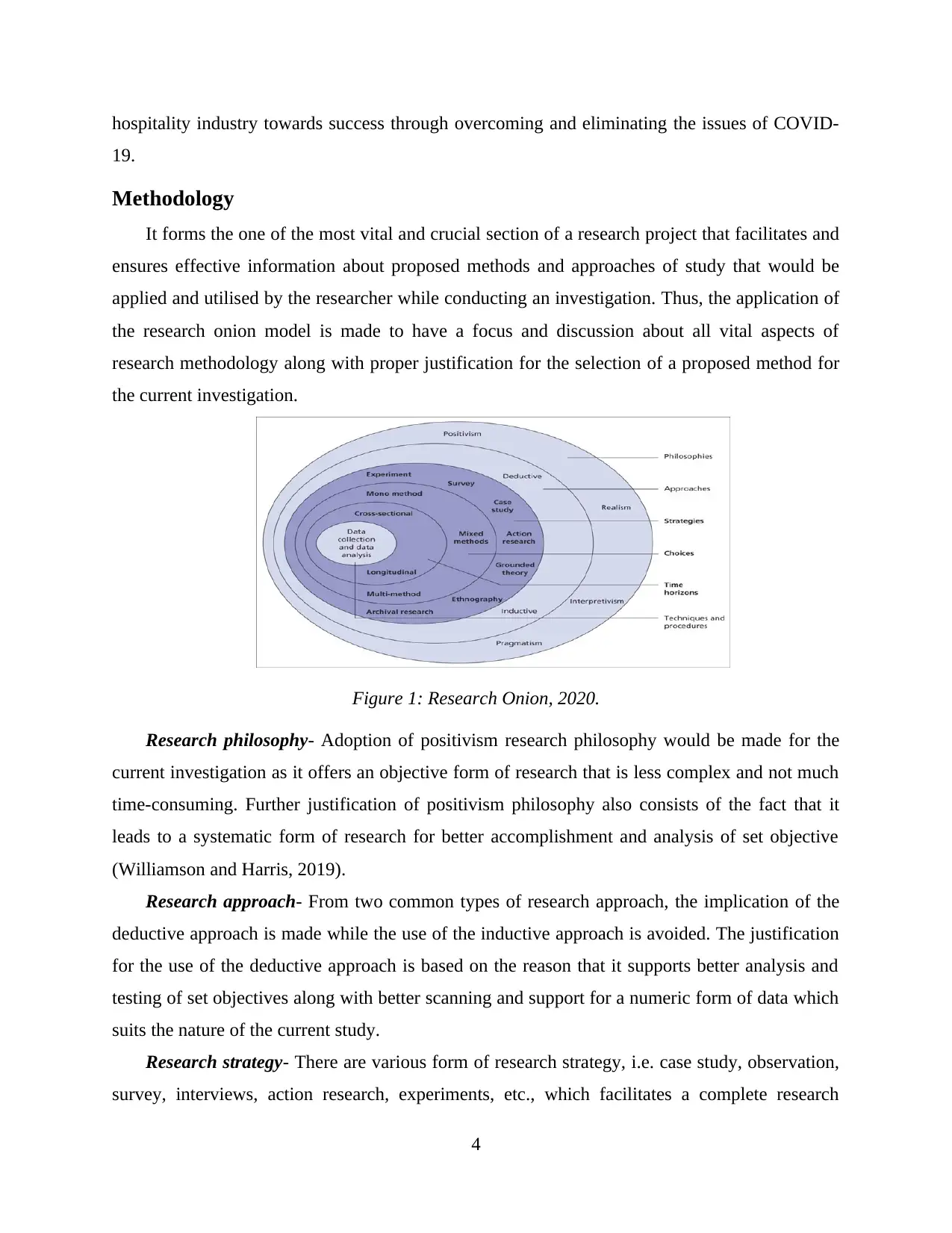
hospitality industry towards success through overcoming and eliminating the issues of COVID-
19.
Methodology
It forms the one of the most vital and crucial section of a research project that facilitates and
ensures effective information about proposed methods and approaches of study that would be
applied and utilised by the researcher while conducting an investigation. Thus, the application of
the research onion model is made to have a focus and discussion about all vital aspects of
research methodology along with proper justification for the selection of a proposed method for
the current investigation.
Figure 1: Research Onion, 2020.
Research philosophy- Adoption of positivism research philosophy would be made for the
current investigation as it offers an objective form of research that is less complex and not much
time-consuming. Further justification of positivism philosophy also consists of the fact that it
leads to a systematic form of research for better accomplishment and analysis of set objective
(Williamson and Harris, 2019).
Research approach- From two common types of research approach, the implication of the
deductive approach is made while the use of the inductive approach is avoided. The justification
for the use of the deductive approach is based on the reason that it supports better analysis and
testing of set objectives along with better scanning and support for a numeric form of data which
suits the nature of the current study.
Research strategy- There are various form of research strategy, i.e. case study, observation,
survey, interviews, action research, experiments, etc., which facilitates a complete research
4
19.
Methodology
It forms the one of the most vital and crucial section of a research project that facilitates and
ensures effective information about proposed methods and approaches of study that would be
applied and utilised by the researcher while conducting an investigation. Thus, the application of
the research onion model is made to have a focus and discussion about all vital aspects of
research methodology along with proper justification for the selection of a proposed method for
the current investigation.
Figure 1: Research Onion, 2020.
Research philosophy- Adoption of positivism research philosophy would be made for the
current investigation as it offers an objective form of research that is less complex and not much
time-consuming. Further justification of positivism philosophy also consists of the fact that it
leads to a systematic form of research for better accomplishment and analysis of set objective
(Williamson and Harris, 2019).
Research approach- From two common types of research approach, the implication of the
deductive approach is made while the use of the inductive approach is avoided. The justification
for the use of the deductive approach is based on the reason that it supports better analysis and
testing of set objectives along with better scanning and support for a numeric form of data which
suits the nature of the current study.
Research strategy- There are various form of research strategy, i.e. case study, observation,
survey, interviews, action research, experiments, etc., which facilitates a complete research
4
⊘ This is a preview!⊘
Do you want full access?
Subscribe today to unlock all pages.

Trusted by 1+ million students worldwide
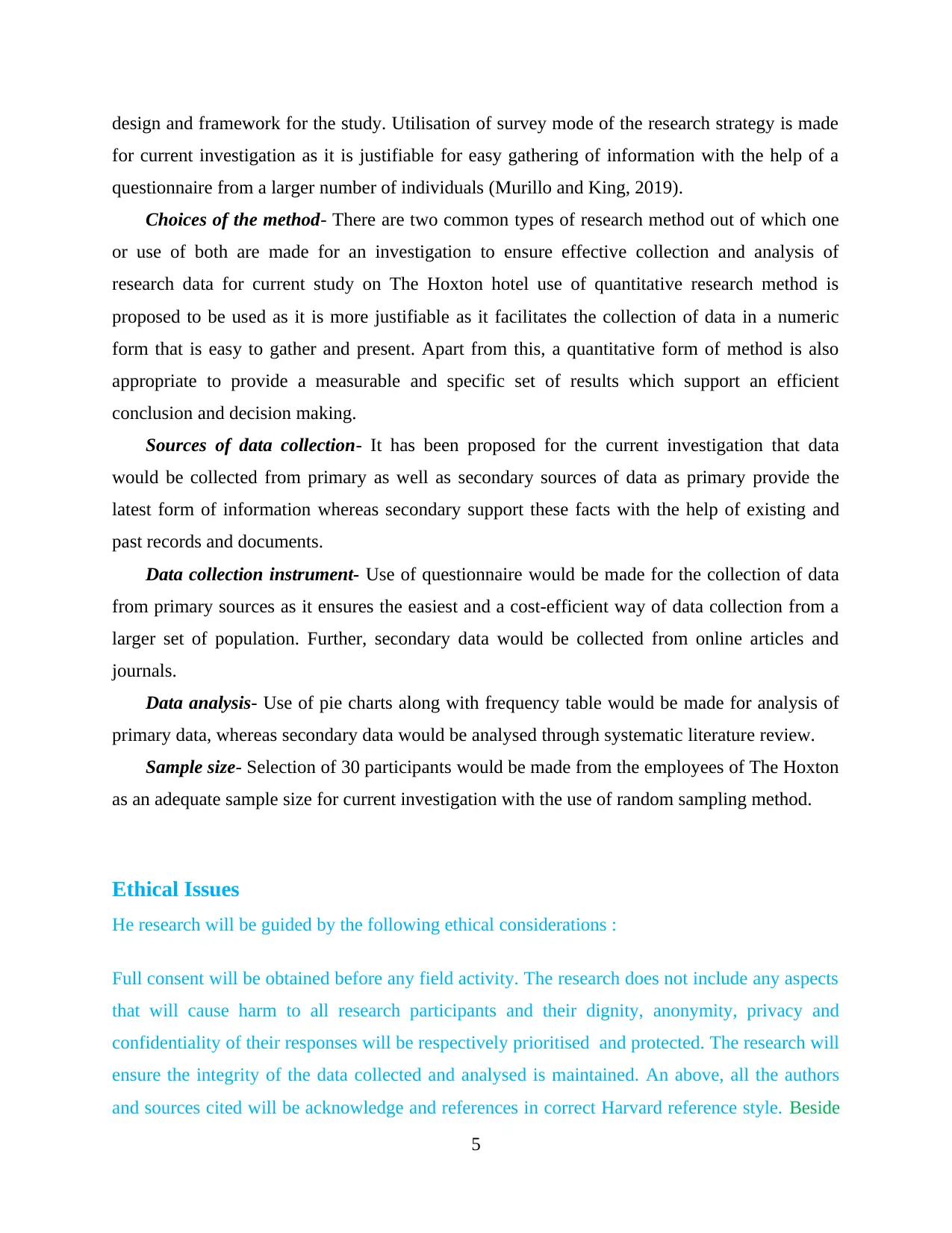
design and framework for the study. Utilisation of survey mode of the research strategy is made
for current investigation as it is justifiable for easy gathering of information with the help of a
questionnaire from a larger number of individuals (Murillo and King, 2019).
Choices of the method- There are two common types of research method out of which one
or use of both are made for an investigation to ensure effective collection and analysis of
research data for current study on The Hoxton hotel use of quantitative research method is
proposed to be used as it is more justifiable as it facilitates the collection of data in a numeric
form that is easy to gather and present. Apart from this, a quantitative form of method is also
appropriate to provide a measurable and specific set of results which support an efficient
conclusion and decision making.
Sources of data collection- It has been proposed for the current investigation that data
would be collected from primary as well as secondary sources of data as primary provide the
latest form of information whereas secondary support these facts with the help of existing and
past records and documents.
Data collection instrument- Use of questionnaire would be made for the collection of data
from primary sources as it ensures the easiest and a cost-efficient way of data collection from a
larger set of population. Further, secondary data would be collected from online articles and
journals.
Data analysis- Use of pie charts along with frequency table would be made for analysis of
primary data, whereas secondary data would be analysed through systematic literature review.
Sample size- Selection of 30 participants would be made from the employees of The Hoxton
as an adequate sample size for current investigation with the use of random sampling method.
Ethical Issues
He research will be guided by the following ethical considerations :
Full consent will be obtained before any field activity. The research does not include any aspects
that will cause harm to all research participants and their dignity, anonymity, privacy and
confidentiality of their responses will be respectively prioritised and protected. The research will
ensure the integrity of the data collected and analysed is maintained. An above, all the authors
and sources cited will be acknowledge and references in correct Harvard reference style. Beside
5
for current investigation as it is justifiable for easy gathering of information with the help of a
questionnaire from a larger number of individuals (Murillo and King, 2019).
Choices of the method- There are two common types of research method out of which one
or use of both are made for an investigation to ensure effective collection and analysis of
research data for current study on The Hoxton hotel use of quantitative research method is
proposed to be used as it is more justifiable as it facilitates the collection of data in a numeric
form that is easy to gather and present. Apart from this, a quantitative form of method is also
appropriate to provide a measurable and specific set of results which support an efficient
conclusion and decision making.
Sources of data collection- It has been proposed for the current investigation that data
would be collected from primary as well as secondary sources of data as primary provide the
latest form of information whereas secondary support these facts with the help of existing and
past records and documents.
Data collection instrument- Use of questionnaire would be made for the collection of data
from primary sources as it ensures the easiest and a cost-efficient way of data collection from a
larger set of population. Further, secondary data would be collected from online articles and
journals.
Data analysis- Use of pie charts along with frequency table would be made for analysis of
primary data, whereas secondary data would be analysed through systematic literature review.
Sample size- Selection of 30 participants would be made from the employees of The Hoxton
as an adequate sample size for current investigation with the use of random sampling method.
Ethical Issues
He research will be guided by the following ethical considerations :
Full consent will be obtained before any field activity. The research does not include any aspects
that will cause harm to all research participants and their dignity, anonymity, privacy and
confidentiality of their responses will be respectively prioritised and protected. The research will
ensure the integrity of the data collected and analysed is maintained. An above, all the authors
and sources cited will be acknowledge and references in correct Harvard reference style. Beside
5
Paraphrase This Document
Need a fresh take? Get an instant paraphrase of this document with our AI Paraphraser
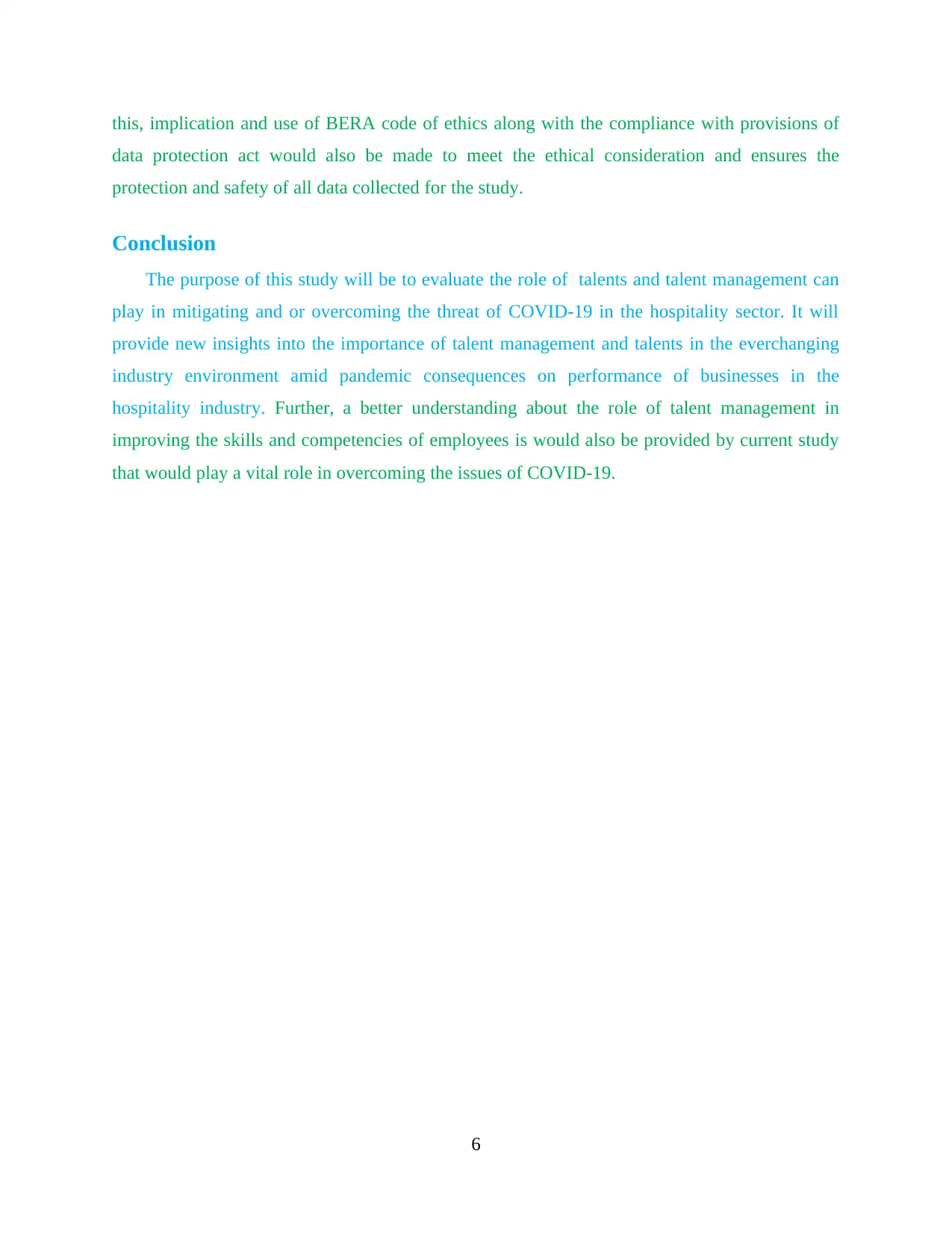
this, implication and use of BERA code of ethics along with the compliance with provisions of
data protection act would also be made to meet the ethical consideration and ensures the
protection and safety of all data collected for the study.
Conclusion
The purpose of this study will be to evaluate the role of talents and talent management can
play in mitigating and or overcoming the threat of COVID-19 in the hospitality sector. It will
provide new insights into the importance of talent management and talents in the everchanging
industry environment amid pandemic consequences on performance of businesses in the
hospitality industry. Further, a better understanding about the role of talent management in
improving the skills and competencies of employees is would also be provided by current study
that would play a vital role in overcoming the issues of COVID-19.
6
data protection act would also be made to meet the ethical consideration and ensures the
protection and safety of all data collected for the study.
Conclusion
The purpose of this study will be to evaluate the role of talents and talent management can
play in mitigating and or overcoming the threat of COVID-19 in the hospitality sector. It will
provide new insights into the importance of talent management and talents in the everchanging
industry environment amid pandemic consequences on performance of businesses in the
hospitality industry. Further, a better understanding about the role of talent management in
improving the skills and competencies of employees is would also be provided by current study
that would play a vital role in overcoming the issues of COVID-19.
6
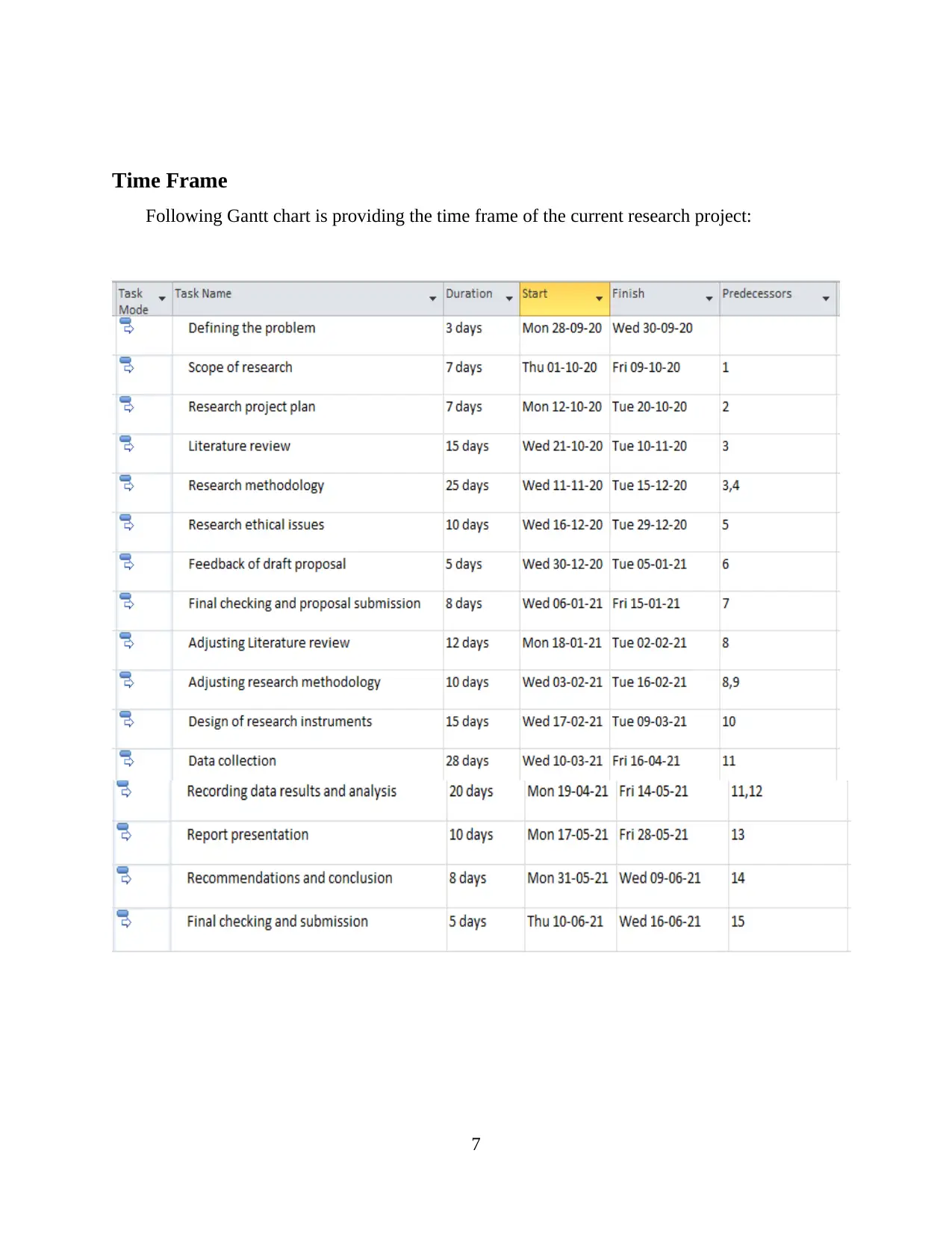
Time Frame
Following Gantt chart is providing the time frame of the current research project:
7
Following Gantt chart is providing the time frame of the current research project:
7
⊘ This is a preview!⊘
Do you want full access?
Subscribe today to unlock all pages.

Trusted by 1+ million students worldwide
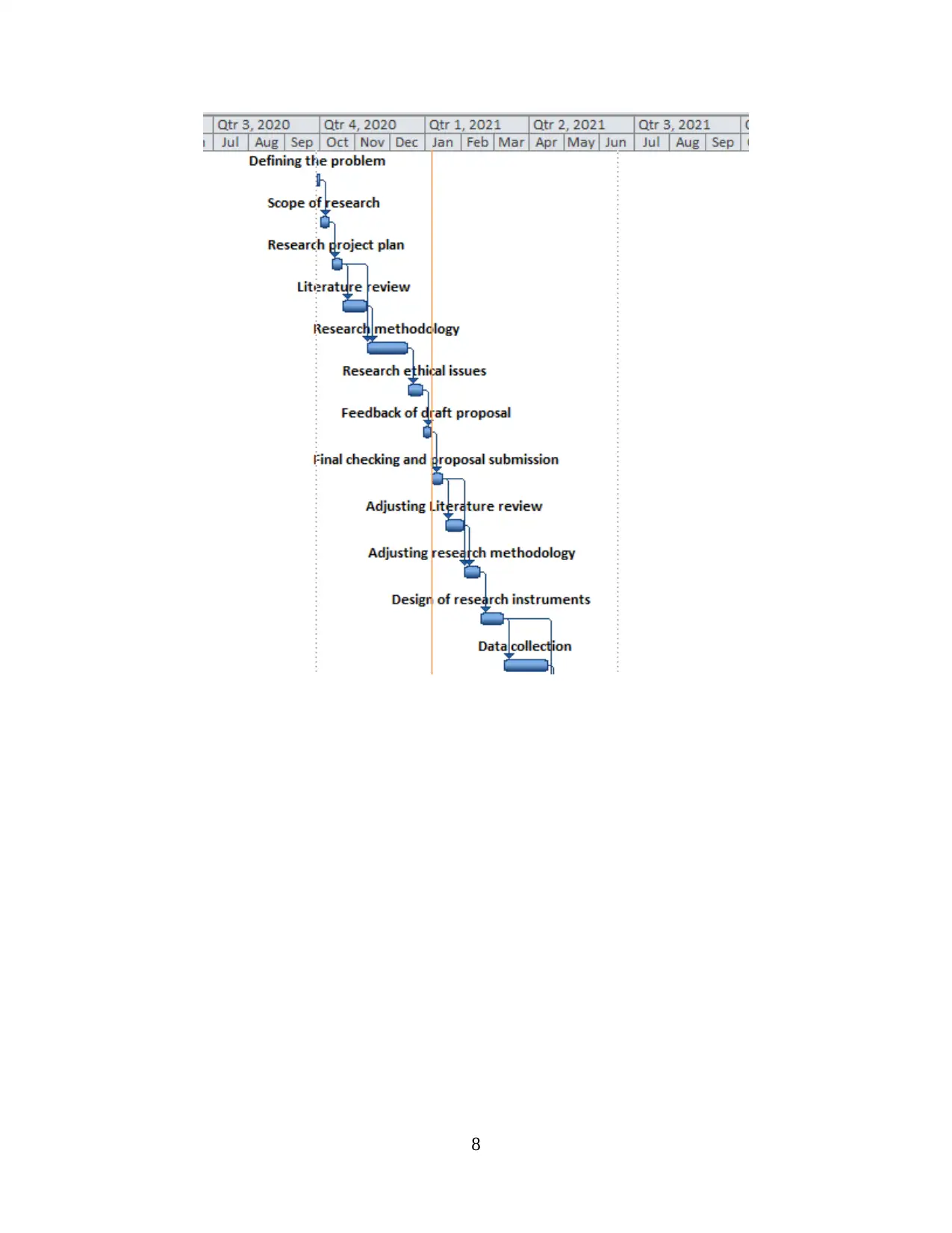
8
Paraphrase This Document
Need a fresh take? Get an instant paraphrase of this document with our AI Paraphraser

9
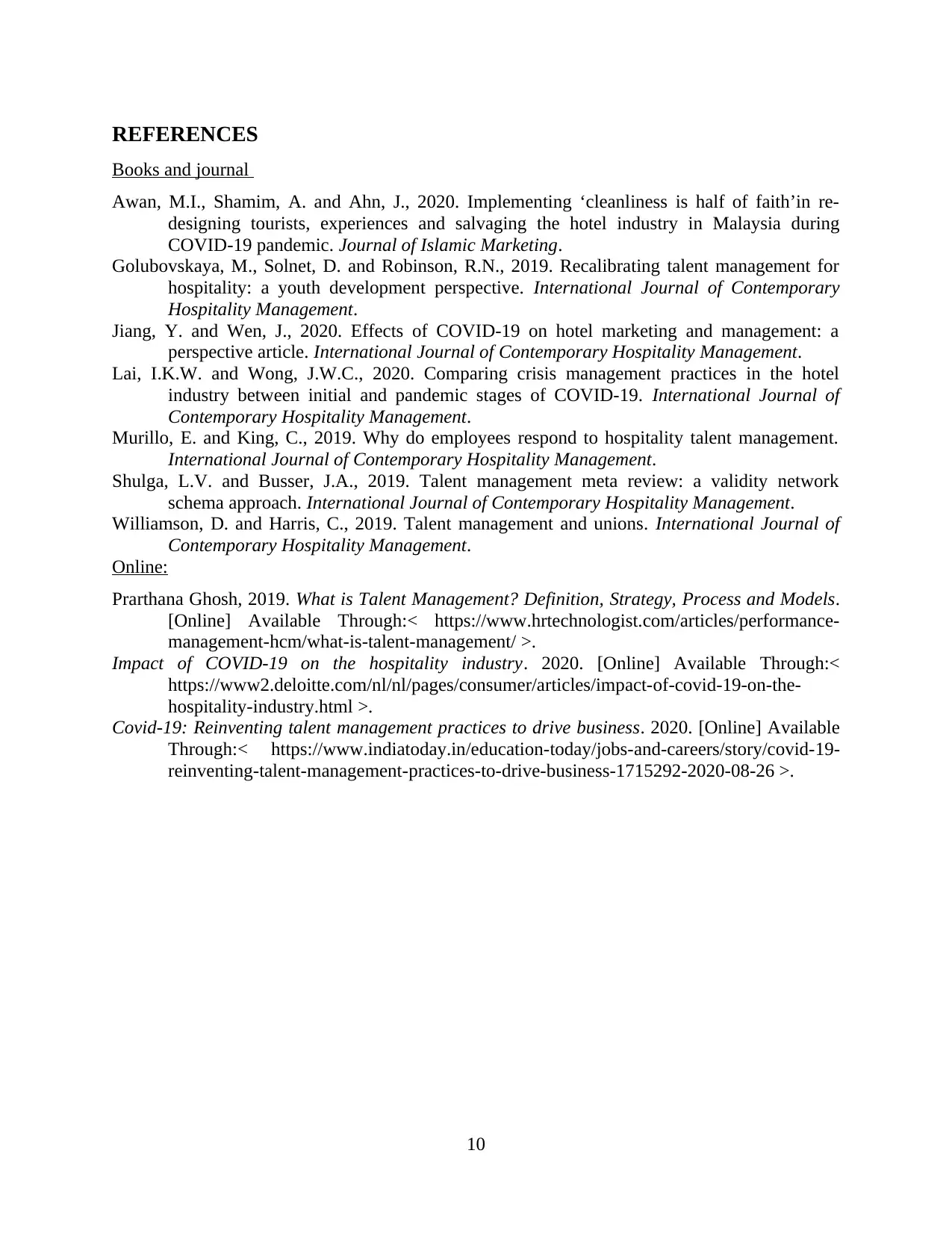
REFERENCES
Books and journal
Awan, M.I., Shamim, A. and Ahn, J., 2020. Implementing ‘cleanliness is half of faith’in re-
designing tourists, experiences and salvaging the hotel industry in Malaysia during
COVID-19 pandemic. Journal of Islamic Marketing.
Golubovskaya, M., Solnet, D. and Robinson, R.N., 2019. Recalibrating talent management for
hospitality: a youth development perspective. International Journal of Contemporary
Hospitality Management.
Jiang, Y. and Wen, J., 2020. Effects of COVID-19 on hotel marketing and management: a
perspective article. International Journal of Contemporary Hospitality Management.
Lai, I.K.W. and Wong, J.W.C., 2020. Comparing crisis management practices in the hotel
industry between initial and pandemic stages of COVID-19. International Journal of
Contemporary Hospitality Management.
Murillo, E. and King, C., 2019. Why do employees respond to hospitality talent management.
International Journal of Contemporary Hospitality Management.
Shulga, L.V. and Busser, J.A., 2019. Talent management meta review: a validity network
schema approach. International Journal of Contemporary Hospitality Management.
Williamson, D. and Harris, C., 2019. Talent management and unions. International Journal of
Contemporary Hospitality Management.
Online:
Prarthana Ghosh, 2019. What is Talent Management? Definition, Strategy, Process and Models.
[Online] Available Through:< https://www.hrtechnologist.com/articles/performance-
management-hcm/what-is-talent-management/ >.
Impact of COVID-19 on the hospitality industry. 2020. [Online] Available Through:<
https://www2.deloitte.com/nl/nl/pages/consumer/articles/impact-of-covid-19-on-the-
hospitality-industry.html >.
Covid-19: Reinventing talent management practices to drive business. 2020. [Online] Available
Through:< https://www.indiatoday.in/education-today/jobs-and-careers/story/covid-19-
reinventing-talent-management-practices-to-drive-business-1715292-2020-08-26 >.
10
Books and journal
Awan, M.I., Shamim, A. and Ahn, J., 2020. Implementing ‘cleanliness is half of faith’in re-
designing tourists, experiences and salvaging the hotel industry in Malaysia during
COVID-19 pandemic. Journal of Islamic Marketing.
Golubovskaya, M., Solnet, D. and Robinson, R.N., 2019. Recalibrating talent management for
hospitality: a youth development perspective. International Journal of Contemporary
Hospitality Management.
Jiang, Y. and Wen, J., 2020. Effects of COVID-19 on hotel marketing and management: a
perspective article. International Journal of Contemporary Hospitality Management.
Lai, I.K.W. and Wong, J.W.C., 2020. Comparing crisis management practices in the hotel
industry between initial and pandemic stages of COVID-19. International Journal of
Contemporary Hospitality Management.
Murillo, E. and King, C., 2019. Why do employees respond to hospitality talent management.
International Journal of Contemporary Hospitality Management.
Shulga, L.V. and Busser, J.A., 2019. Talent management meta review: a validity network
schema approach. International Journal of Contemporary Hospitality Management.
Williamson, D. and Harris, C., 2019. Talent management and unions. International Journal of
Contemporary Hospitality Management.
Online:
Prarthana Ghosh, 2019. What is Talent Management? Definition, Strategy, Process and Models.
[Online] Available Through:< https://www.hrtechnologist.com/articles/performance-
management-hcm/what-is-talent-management/ >.
Impact of COVID-19 on the hospitality industry. 2020. [Online] Available Through:<
https://www2.deloitte.com/nl/nl/pages/consumer/articles/impact-of-covid-19-on-the-
hospitality-industry.html >.
Covid-19: Reinventing talent management practices to drive business. 2020. [Online] Available
Through:< https://www.indiatoday.in/education-today/jobs-and-careers/story/covid-19-
reinventing-talent-management-practices-to-drive-business-1715292-2020-08-26 >.
10
⊘ This is a preview!⊘
Do you want full access?
Subscribe today to unlock all pages.

Trusted by 1+ million students worldwide
1 out of 12
Related Documents
Your All-in-One AI-Powered Toolkit for Academic Success.
+13062052269
info@desklib.com
Available 24*7 on WhatsApp / Email
![[object Object]](/_next/static/media/star-bottom.7253800d.svg)
Unlock your academic potential
Copyright © 2020–2026 A2Z Services. All Rights Reserved. Developed and managed by ZUCOL.





